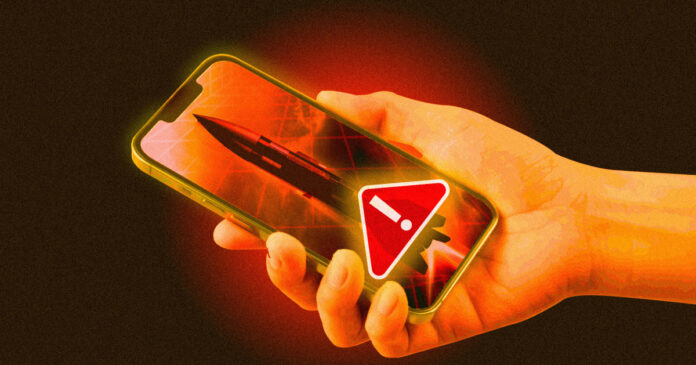As the Israel-Hamas war enters its second month, some Jewish Americans are turning to an information source little known to non-Israelis: rocket alert apps.
The platforms, which have been around for nearly a decade and draw on real-time data from Israel’s Home Front Command, warn users of incoming rocket attacks sometimes just moments before they happen.
Around half a dozen versions, typically with “red alert” in their titles or descriptions, are available in the iOS and Android app stores. Despite variations ranging from chat functions to different mapping tools, the data they provide is limited — typically just a time stamp and the name of a town.
From his bedroom in Seattle, John Michael has been checking a red alert app in recent weeks to see whether any rockets have landed near his friend’s house in Tel Aviv or the kibbutz where he taught this summer. The 25-year-old, who programs educational workshops for high-schoolers, asked to withhold his last name citing safety concerns at a time of rising antisemitism.
“I feel like the red alert app helps me to not forget what they’re going through,” he said of his connections in Israel, including a friend who recently went off to serve in the Israel Defense Forces. At a vigil he helped organize at his home shortly after Hamas’ Oct. 7 attack, John Michael remembered attendees’ phones pinging with red alert notifications “just going off and off and off.”
Over the last few weeks, usage of red alert apps has exploded both within Israel and abroad.
In Israel, daily downloads of four common versions in the Google Play and Apple App Stores skyrocketed from a total of just 124 on Oct. 6 to nearly 48,000 on Oct. 8, according to data the analytics firm Apptopia provided to NBC News. Daily active users of those apps on both operating systems in Israel surpassed 288,000 as of Nov. 1, a nearly 61-fold increase since before the attack.
In the U.S., both daily active users and downloads of the four apps surged past 10,000 on Oct. 7, after languishing in the single digits and teens the week prior. By the start of November, daily active users had more than tripled to about 31,600.
Liv Schneider, a 24-year-old regional manager for StandWithUs, a nonprofit group that fights antisemitism, called the platforms a “lifeline” beyond mainstream media coverage of a conflict that has been marred by online misinformation and major disruptions to telecommunications, particularly within Gaza. But the apps have offered partial and sometimes unreliable snapshots of situations on the ground, potentially coloring users’ view of the conflict.
While the effects of Hamas rocket strikes on Israel have been limited over the past month, Israel has carried out devastating airstrikes in the Gaza Strip — a region half the size of New York City where an estimated 45% of housing units have been damaged or destroyed, according to United Nations data.
But none of the red alert apps track those strikes, leaving many Palestinians in and outside the region without equivalent real-time alerts. The IDF has said it has made phone calls and sent text messages to warn Gazans about impending attacks, but its bombardments have slashed internet and cellular service there.
The apps have also been vulnerable to cyberattacks. On Oct. 7, the developer of Red Alert Rocket Alerts posted comments in the Google Play store notifying users that access would be temporarily blocked to those outside Israel, citing a cyberattack that flooded the app with fake traffic. Days later, a Singapore-based cybersecurity firm identified a hacktivist group that it said had breached a different red alert app and attempted to send fake notifications, including alerts for a nuclear bomb, but couldn’t confirm whether users had received them.
None of the red alert apps’ developers responded to requests for comment.
Red alert apps first gained steam in Israel during the 2014 Gaza War, one of the Israeli-Palestinian conflict’s deadliest escalations in decades up until last month. Although Israel estimates its Iron Dome system intercepts at least 90% of rockets launched by adversaries, the country has said it considers early warning systems a “pillar” of its passive defense strategy to protect civilians. In 2016, the IDF released its own red alert app to the public, several years after earlier ones by independent developers came online.
Now, the apps’ growing uptake among users far beyond Israel’s borders is giving many people a glimpse of a far different security situation than what they may be familiar with.
By providing a continuous stream of military data directly to the public, “these apps are actually telling us that this is a state of constant war,” said Fabio Cristiano, an assistant professor of conflict studies at Utrecht University in the Netherlands. The result, he said, is that “this kind of violence is normalized.”
For some Jewish Americans who’ve turned to red alert apps in recent weeks, their value is equal parts informational and emotional. Liat Yardeni, 59, is a rabbi for Sephardic Temple Tifereth Israel in Los Angeles who said the platforms have helped her feel connected to her homeland “every second of the day.”
But that sense of proximity to the war has sometimes been jarring, including for those accustomed to following Israeli politics and current events closely.
“It’s kind of crazy to think that you have an app to warn you that there’s a rocket about to land on your head — I don’t even know what the word is,” said Susan Heller Pinto, the vice president of international policy at the Anti-Defamation League.
With a red alert app wedged on her phone between Zappos and Zoom apps, Heller Pinto, 56, said monitoring notifications has often been overwhelming — especially when she spotted one for an Israeli town where her son was spending Sabbath, though he ultimately remained safe.
“I’m looking through probably 50 alerts from today,” she said late last month. “I can’t count it.”


